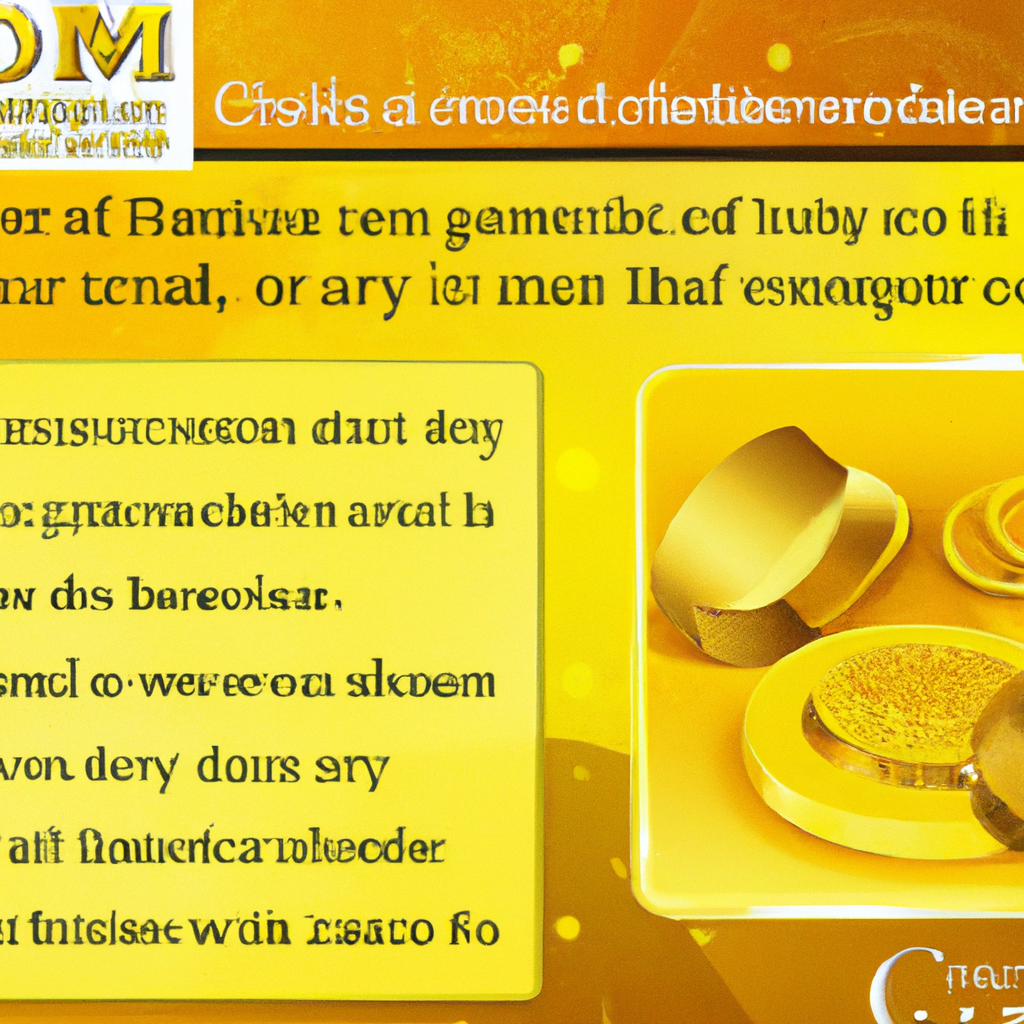If you’re curious about how Muslims invest in gold, this article will provide you with valuable insights. When it comes to investing in this precious metal, Muslims follow certain guidelines that align with their religious beliefs. From adhering to Shariah principles to exploring various investment options, Muslims have developed unique ways to participate in the gold market. By understanding the fundamentals of Islamic finance and the specific rules surrounding gold investments, you’ll gain a deeper understanding of how Muslims navigate this lucrative sector. So, let’s explore the fascinating world of how Muslims invest in gold!

Why is gold investment important for Muslims?
Introduction
Gold has held immense significance for Muslims throughout history due to its unique qualities and its alignment with Islamic principles. For Muslim investors, gold investment serves as a means of wealth preservation, protection against inflation, and adherence to Shariah-compliant financial practices. This article aims to delve into the importance of gold investment for Muslims, highlighting its historical significance, role in Islamic finance, and the various avenues available for Shariah-compliant gold investments.
Significance in Islamic finance
Islamic finance is rooted in the principles outlined by Shariah, which governs all aspects of a Muslim’s life, including financial transactions. Gold has a special place in Islamic finance as it is considered a reliable store of value and a currency of intrinsic worth. Its acceptance as a medium of exchange and a wealth preservation asset makes it an essential component of Islamic financial practices.
Historical importance
Gold has played a pivotal role in the history of Muslim societies, dating back to the time of Prophet Muhammad (peace be upon him). It has been used as a form of currency, a medium for trade, and a means of storing wealth. Islamic history is replete with examples of gold’s significance, from the gold dinar coinage during the Abbasid Caliphate to the opulent gold jewelry favored by Muslim rulers. This historical importance contributes to the enduring value and allure of gold for Muslims.
Protection against inflation
Inflation erodes the value of currencies over time, making it crucial for individuals to safeguard their wealth against its detrimental effects. Gold has long been recognized as a hedge against inflation due to its scarcity, durability, and universal recognition as a valuable asset. By investing in gold, Muslims can protect their purchasing power and preserve their wealth in the face of rising prices.
Safe and tangible asset
Unlike other forms of investments such as stocks or bonds, gold is a tangible asset that offers a sense of security to investors. It is not reliant on the performance of companies or economic indicators, making it less susceptible to market fluctuations and economic uncertainties. Additionally, gold can be physically held and stored, providing investors with a tangible representation of their wealth and a sense of ownership.
Enhancing wealth preservation
Wealth preservation is a fundamental objective for Muslim investors, and gold investment serves as a vital tool in achieving this goal. Gold’s ability to retain its value over time, its historical performance as a safe-haven asset, and its status as a globally recognized store of wealth make it an effective means for Muslims to preserve and grow their financial assets.
Understanding Shariah-compliant gold investment
Guiding principles of Shariah
Shariah-compliant investments adhere to specific ethical and legal principles outlined in Islamic jurisprudence. These principles include the prohibition of interest (riba), uncertainty (gharar), and the involvement of haram substances or activities. Understanding these guiding principles is essential in ensuring that gold investments remain in line with Islamic principles.
Prohibition of riba (interest)
Interest or usury is strictly prohibited in Islam as it is considered exploitative and detrimental to society. This prohibition extends to any form of investment that involves earning interest or receiving income from interest-bearing transactions. As gold investment does not involve interest, it is an attractive option for Muslim investors seeking Shariah-compliant alternatives.
Prohibition of gharar (uncertainty)
Islamic finance discourages investments that involve excessive uncertainty or ambiguity. Gharar refers to transactions that involve excessive risk or uncertainty, leading to potential exploitation or unequal distribution of wealth. Shariah-compliant gold investments ensure that there is clarity in the transaction terms and that both parties have a clear understanding of the nature of the investment.
Prohibition of haram substances or activities
Islam prohibits investments in activities or substances that are considered haram (forbidden), such as alcohol, gambling, pork, or any other activities that go against the principles of Islamic ethics. Gold, being a naturally occurring metal and devoid of any haram attributes, is deemed an acceptable investment option for Muslim investors.
Investing in physical gold
Muslims have the option to invest in physical gold, which involves the direct ownership and possession of gold in various forms such as jewelry, coins, or bars. This form of gold investment aligns with Islamic principles as it involves the acquisition of a tangible asset without any interest-based transactions or elements of uncertainty.
Investing in gold-related financial instruments
In addition to physical gold, Muslims can also invest in gold-related financial instruments that comply with Shariah guidelines. These include gold exchange-traded funds (ETFs), Islamic gold accounts, gold futures contracts, gold mining company stocks, and commodity murabahah. These financial instruments provide alternative avenues for Muslim investors to gain exposure to the gold market while ensuring compliance with Islamic principles.
Physical gold investments for Muslims
Types of physical gold
Muslim investors have the option to invest in different types of physical gold, including gold jewelry, gold coins, and gold bars. Gold jewelry is a popular choice for many Muslims, as it combines the allure of gold with wearable craftsmanship. Gold coins, such as the Islamic dinar or the Turkish lira, hold historical significance and can be valuable collector’s items. Gold bars, on the other hand, offer a more straightforward and pure form of gold investment.
Gold jewelry as an investment
For Muslims, gold jewelry serves both ornamental and investment purposes. It can be worn and enjoyed while also providing a form of wealth preservation. However, when considering gold jewelry as an investment, it is important to factor in the craftsmanship and design, as these factors can affect the value and resale potential of the jewelry.
Gold coins and bars
Gold coins and bars are popular options for Muslim investors seeking a pure and tangible form of gold investment. Coins such as the Islamic dinar or gold sovereigns hold historical and cultural significance, making them prized possessions for collectors. Gold bars, on the other hand, offer a more liquid and easily tradable form of investment.
Importance of purity and weight
When investing in physical gold, Muslims should prioritize the purity and weight of the gold. The purity of gold is measured in karats, with 24 karat gold being the highest level of purity. It is important to ensure that the gold being purchased meets the standards of purity outlined in Islamic finance. Additionally, the weight of the gold determines its value, with larger bars and coins typically holding greater worth.
Storing physical gold securely
As physical gold involves the ownership and possession of a tangible asset, it is crucial to store it securely. Muslim investors should consider utilizing secure vaults, safety deposit boxes, or specialized storage facilities to protect their gold holdings from theft or damage. Ensuring the safety and security of physical gold is essential for preserving its value and maintaining peace of mind for investors.
Zakat on gold holdings
Zakat is the obligatory annual giving of a specified percentage of wealth to the needy, as prescribed by Islamic teachings. Muslim investors who hold a significant amount of gold are required to pay Zakat on their gold holdings. The calculation of Zakat on gold is based on the weight and value of the gold held, and it serves as a means of redistributing wealth and fulfilling the social obligations of Muslims.
Investing in gold-related financial instruments
Gold exchange-traded funds (ETFs)
Gold ETFs are investment funds that track the performance of gold prices and aim to replicate the returns of the underlying gold market. Islamic ETFs are designed to comply with Shariah principles, avoiding interest-based transactions and adhering to Shariah-compliant investment guidelines. Muslim investors can gain exposure to the gold market through these ETFs, providing them with diversification and ease of trading.
Islamic gold accounts
Islamic gold accounts are offered by Islamic banks and financial institutions, allowing individuals to invest in gold without the need for physical possession. These accounts operate on the basis of a buy-and-sell agreement, ensuring there are no interest-based transactions. Muslim investors can benefit from the convenience of owning gold through Islamic gold accounts while adhering to Shariah-compliant investment practices.
Gold futures contracts
Gold futures contracts provide investors with the opportunity to buy or sell gold at a predetermined price and date in the future. Shariah-compliant gold futures contracts operate on the basis of a commodity murabahah structure, where the sale and purchase of gold are conducted in a halal manner. Muslim investors can utilize gold futures contracts to gain exposure to the gold market while ensuring compliance with Islamic financial principles.
Gold mining company stocks
Investing in gold mining company stocks allows Muslim investors to indirectly benefit from the performance of the gold industry. However, it is essential to ensure that the mining companies adhere to Shariah guidelines and do not engage in haram activities. By investing in Shariah-compliant gold mining stocks, Muslim investors can participate in the potential profits of the gold industry while maintaining compliance with Islamic principles.
Commodity murabahah
Commodity murabahah is a financing technique that allows Muslim investors to gain exposure to the gold market while adhering to Islamic financial principles. In this arrangement, a financial institution purchases gold on behalf of an investor and sells it to them at a higher price, with the profit being determined upfront. Commodity murabahah provides a Shariah-compliant alternative for Muslim investors seeking gold investment opportunities.

Benefits and risks of gold investment
Portfolio diversification
Gold investment enables Muslim investors to diversify their investment portfolios, reducing the concentration of risk. As gold tends to have a low correlation with other asset classes, such as stocks or bonds, it can serve as a valuable tool in mitigating portfolio volatility and enhancing long-term returns.
Potential for capital appreciation
Gold has historically demonstrated the potential for capital appreciation, with periods of significant price increases. While it is important to note that past performance does not guarantee future results, gold investment offers the opportunity for Muslims to benefit from potential price appreciation over time.
Hedge against economic uncertainties
During times of economic uncertainties, gold has often served as a safe haven asset. It has proven to be a reliable store of value, protecting against the depreciation of currencies and offering stability during times of market volatility. By investing in gold, Muslims can hedge against economic uncertainties and safeguard their wealth.
Liquidity and ease of trading
Gold investment offers liquidity and ease of trading, providing investors with the flexibility to buy or sell their gold holdings efficiently. The global gold market operates 24 hours a day, allowing investors to access their investments at any time. This liquidity ensures that gold investments can be easily converted into cash whenever needed.
Inherent risks and market volatility
As with any investment, gold carries inherent risks, including price volatility and the potential for capital loss. The value of gold can fluctuate based on various factors, including global economic conditions, geopolitical events, and investor sentiment. Muslim investors should be aware of these risks and carefully consider their risk tolerance before investing in gold.
Currency fluctuations
Gold is priced in various currencies, and currency fluctuations can impact the value of gold investments. Changes in currency exchange rates can influence the purchasing power of gold and the returns gained from gold investments. Muslim investors should take into account the potential impact of currency fluctuations on their gold holdings and consider diversifying their currency exposure accordingly.
Shariah-compliant investment platforms
Certification and compliance standards
Shariah-compliant investment platforms and products often undergo certification and compliance screening by Shariah scholars or specialized organizations. These certifications provide assurance to Muslim investors that the investment platform or product meets the requirements of Islamic finance. Understanding the certification and compliance standards can help Muslim investors make informed choices when selecting investment platforms.
Islamic banks and financial institutions
Islamic banks and financial institutions play a crucial role in providing Shariah-compliant investment options for Muslim investors. These institutions are dedicated to operating within the ethical and legal framework of Islamic finance, offering a broad range of investment products and services that adhere to Shariah principles.
Islamic robo-advisory services
Robo-advisory services have emerged as a popular and convenient option for investors seeking automated investment management. Islamic robo-advisory services cater specifically to Muslim investors by offering Shariah-compliant investment portfolios. These services utilize technology and algorithms to create customized investment strategies that align with Islamic financial principles.
Online bullion dealers
Online bullion dealers provide an accessible platform for Muslim investors to purchase and sell physical gold. These dealers often offer a wide range of gold products, including gold coins, bars, and jewelry. Muslim investors should ensure that the online bullion dealer they choose complies with the necessary Shariah guidelines to ensure their gold investments remain in line with Islamic principles.
Regulatory considerations
When investing in gold or other financial instruments, Muslim investors should consider the regulatory framework governing their investments. Regulatory bodies in different countries may have specific guidelines and requirements for Shariah-compliant investments. Understanding the regulatory considerations can help Muslim investors make informed decisions and ensure compliance with legal and ethical standards.

Gold investment strategies for Muslims
Long-term wealth preservation
Gold investment can be part of a long-term wealth preservation strategy for Muslim investors. By holding a portion of their investment portfolio in gold, investors can protect their wealth against inflation, diversify their investment holdings, and potentially benefit from capital appreciation over time.
Dollar-cost averaging
Dollar-cost averaging is an investment strategy that involves regularly investing a fixed amount of money into a particular asset, regardless of its price fluctuations. Muslim investors can implement a dollar-cost averaging approach when investing in gold, spreading their investments over time and potentially benefiting from both high and low price points.
Gold price analysis
Monitoring and analyzing gold price movements can be a valuable tool for Muslim investors. Technical and fundamental analyses can provide insights into potential buying or selling opportunities, helping investors make informed decisions based on market trends and indicators. Muslim investors should consider utilizing reliable sources of information and seeking expert advice when analyzing gold prices.
Strategic asset allocation
Strategic asset allocation involves dividing an investment portfolio among different asset classes, such as stocks, bonds, and gold, based on an investor’s financial goals, risk tolerance, and investment horizon. Muslim investors can strategically allocate a portion of their portfolio to gold as a means of diversification and wealth preservation.
Risk management techniques
Implementing risk management techniques is crucial for any investment strategy, including gold investment. Muslim investors should consider setting stop-loss orders or defining the maximum percentage of their portfolio allocated to gold. These risk management techniques can help mitigate potential losses and protect against market volatility.
Investment horizon and goals
The investment horizon and goals of Muslim investors play a significant role in determining the appropriate gold investment strategy. Investors with a longer-term horizon may choose to hold a higher percentage of their portfolio in gold, while those seeking shorter-term gains may prefer a more active trading approach. Understanding individual investment goals and timeframes is essential in formulating an effective gold investment strategy.
Zakat on gold investments
Concept of Zakat in Islam
Zakat is an obligatory act of worship in Islam, rooted in the principles of caring for the less fortunate and redistributing wealth. It is considered one of the five pillars of Islam, alongside faith, prayer, fasting, and pilgrimage. Muslims who meet the prescribed criteria are required to pay Zakat on their wealth, including their gold investments.
Eligibility and calculation
Muslim investors who hold gold investments that meet or exceed the Nisab, a minimum threshold of wealth, may be liable to pay Zakat. The calculation of Zakat on gold investments typically involves determining the weight and purity of the gold and applying the appropriate percentage, which is often 2.5%, to the market value of the gold. The accumulated Zakat amount is then distributed to eligible recipients according to Islamic teachings.
Impact of gold price fluctuations
Gold price fluctuations can impact the calculation of Zakat on gold investments, as the market value of the gold is a determining factor. Muslim investors should consider the prevailing gold prices at the time of calculating Zakat to ensure an accurate assessment of their gold holdings. It is important to consult with knowledgeable individuals or Islamic scholars to ensure compliance with Zakat obligations.
Charitable benefits and obligations
Paying Zakat on gold investments not only fulfills a religious obligation but also contributes to charitable causes and the betterment of society. The funds collected through Zakat are used to support the poor, the needy, and other eligible recipients as prescribed by Islamic teachings. Muslim investors can experience the satisfaction of fulfilling their charitable obligations while maximizing the benefits of their gold investments.
Distribution of Zakat funds
The distribution of Zakat funds is regulated by Islamic principles, ensuring that the funds are allocated to individuals and causes in need. Islamic scholars and reputable Islamic institutions play a crucial role in overseeing the distribution of Zakat funds, ensuring that the recipients meet the eligibility criteria and that the funds are disbursed in a fair and equitable manner.

Tax considerations for Muslim investors
Tax implications on gold ownership
Muslim investors should be aware of the tax implications associated with gold ownership in their respective countries. Taxes on gold may vary depending on factors such as capital gains tax, wealth tax, or import duties. Understanding the tax laws and regulations can help Muslim investors make informed decisions regarding their gold investments and ensure compliance with applicable tax obligations.
Tax-exempt investment options
In certain jurisdictions, there may be tax-exempt investment options available for Muslim investors seeking Shariah-compliant gold investments. These options may provide favorable tax treatment, allowing investors to maximize their returns while staying within the bounds of Islamic finance. Muslim investors should explore the tax-exempt investment options specific to their country or consult with tax professionals for personalized guidance.
Wealth and inheritance taxes
Wealth taxes and inheritance taxes can impact the net worth of individuals and the transfer of wealth to future generations. Muslim investors should be cognizant of these taxes and consider the potential implications on their gold investments. Engaging in proactive tax planning and seeking professional advice can help mitigate potential tax burdens and ensure the preservation of wealth.
Shariah-compliant tax planning
Shariah-compliant tax planning involves structuring investments and financial transactions in a manner that adheres to Islamic principles while minimizing tax liabilities. Muslim investors should explore Shariah-compliant tax planning strategies to ensure that their gold investments are optimally structured from both a Shariah and tax perspective.
Professional tax advice
Tax laws and regulations can be complex and subject to change. It is advisable for Muslim investors to seek professional tax advice to navigate the intricacies of tax considerations in relation to their gold investments. Tax professionals with expertise in both Islamic finance and local tax laws can provide tailored guidance to ensure compliance and maximize tax-efficient investment strategies.
Role of Islamic scholars in gold investment
Qualification and expertise
Islamic scholars play a crucial role in guiding Muslim investors in matters related to gold investment. These scholars possess a deep understanding of Islamic finance, Shariah principles, and the ethical considerations surrounding investments. Their qualification and expertise provide Muslim investors with valuable insights and ensure that their gold investments remain in accordance with Islamic teachings.
Fatwa issuance process
Fatwa is an Islamic legal ruling issued by qualified scholars on matters that require religious guidance. In the context of gold investment, Islamic scholars may issue fatwas to provide clarification on the permissibility or prohibition of certain investment practices. The issuance of fatwas involves a thorough process of research, analysis, and deliberation to ensure comprehensive and informed guidance.
Rulings on gold investment
Islamic scholars have issued rulings on various aspects of gold investment to assist Muslim investors in making informed decisions. These rulings cover topics such as the eligibility of gold for Zakat, the permissibility of certain gold-related financial instruments, and the compliance of specific gold investment practices with Shariah principles. Muslim investors can rely on these rulings to navigate the complexities of gold investment in a Shariah-compliant manner.
Advising the Muslim community
Islamic scholars play a crucial role in advising the Muslim community on matters of faith, including gold investment. They provide educational resources, deliver sermons, and engage in dialogue to promote awareness and understanding of Islamic financial principles. Their guidance ensures that Muslim investors are equipped with the necessary knowledge to make well-informed decisions regarding their gold investments.
Addressing evolving financial products
As financial markets evolve, new investment products and practices emerge, necessitating continuous review and guidance from Islamic scholars. Scholars play a vital role in analyzing and assessing the compatibility of emerging financial products with Shariah principles. By addressing evolving financial products, scholars ensure that Muslim investors remain well-informed and can adapt their investment strategies accordingly.









